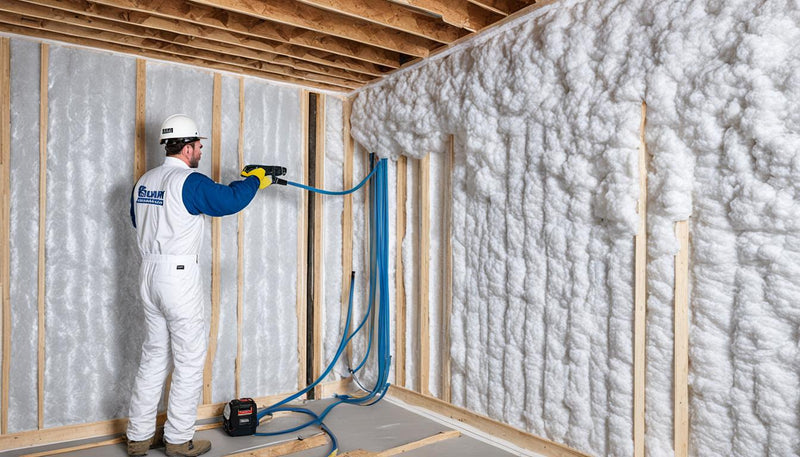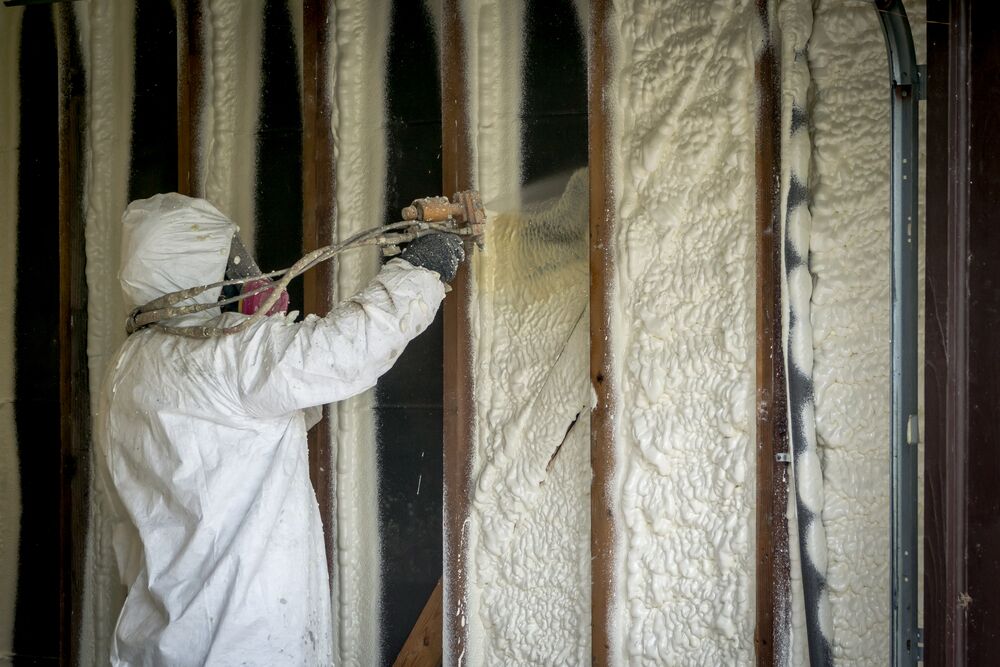Usual Myths Regarding Spray Foam: Debunking the Misconceptions
Usual Myths Regarding Spray Foam: Debunking the Misconceptions
Blog Article
Spray Foam: The Ultimate Solution for Air Sealing and Insulation
Spray foam insulation has emerged as a leading service for effective air sealing and thermal insulation, using a distinct combination of residential or commercial properties that establish it apart from standard techniques. Comprehending the full range of its benefits, setup procedures, and comparisons with various other insulation kinds is essential for making notified choices.
What Is Spray Foam?
Spray foam is a versatile insulation product that incorporates the concepts of air sealing and thermal resistance to enhance energy effectiveness in structures. Made up mainly of polyurethane or other similar substances, spray foam is used as a fluid that increases upon contact with surfaces, producing a strong, continuous layer of insulation. This unique property allows it to fill up spaces, fractures, and gaps that typical insulation materials might forget, offering a remarkable air seal.
There are two major kinds of spray foam: open-cell and closed-cell. Open-cell spray foam is lighter and extra flexible, using excellent noise absorption and a lower R-value per inch - Spray Foam. In comparison, closed-cell spray foam is denser, giving a greater R-value, dampness resistance, and included architectural integrity to developing elements
The application process normally involves specialized equipment, guaranteeing a smooth application that sticks to numerous substrates, including wood, steel, and concrete. This adaptability makes spray foam appropriate for both new constructions and retrofitting existing structures. Its capacity to develop an airtight obstacle considerably adds to minimizing energy consumption and boosting interior air top quality, consequently making it a recommended choice among building contractors and home owners alike.
Benefits of Spray Foam Insulation
One of one of the most significant benefits of spray foam insulation is its extraordinary capacity to develop a continual air obstacle, which efficiently decreases power loss. Unlike typical insulation products, spray foam expands to fill voids and cracks, making certain that air leakage is dramatically decreased. This characteristic not only improves power effectiveness yet also results in lower energy expenses over time.
In addition, spray foam insulation offers exceptional thermal resistance, adding to an extra secure interior environment. Its high R-value per inch enables efficient insulation in confined rooms, making it perfect for attic rooms, wall surfaces, and crawl areas. The moisture-resistant residential or commercial properties of spray foam help avoid mold and mildew and mildew development, advertising healthier living problems.
Another essential benefit of spray foam insulation is its sound-dampening top qualities (Spray Foam). It properly decreases sound transmission in between spaces, creating a quieter and extra comfy home environment. The durability of spray foam additionally stands apart, as it does not droop or clear up gradually, keeping its performance throughout its lifespan
How Spray Foam Functions
Recognizing how spray foam insulation works is necessary for valuing its performance in air securing and thermal resistance. Spray foam insulation consists of 2 key parts: isocyanate and polyol resin. When these components are mixed, they undertake a chain reaction that triggers the product to increase quickly, developing a thick foam that fills up tooth cavities, gaps, and cracks.
As the foam broadens, it complies with surface areas, developing a closed seal that considerably decreases air infiltration. This particular makes spray foam insulation highly reliable at avoiding drafts and wetness penetration, which can bring about energy loss and damage in time. Furthermore, the closed-cell variant of spray foam uses superior thermal resistance due to its inflexible structure, efficiently minimizing warmth transfer.
The one-of-a-kind properties of spray foam enable it to adapt irregular surface areas, ensuring extensive insurance coverage and a seamless obstacle. As a result, spray foam insulation not just boosts power performance yet likewise adds to boosted interior air high quality by minimizing the accumulation of allergens and contaminants. click now Ultimately, comprehending the technicians behind spray foam highlights its role as an exceptional selection for insulation and air sealing in both household and industrial applications.
Installation Refine Overview

Prior to installation, the area has to be appropriately cleaned and prepped, guaranteeing that surface areas are complimentary from dust, particles, and dampness. Due to the fact that impurities can endanger attachment and general performance, this step is important. As soon as the area is prepared, the application entails mixing both components of the spray foam, which broadens upon call and loads voids efficiently.
Educated professionals must perform the installation, utilizing customized equipment to ensure uniform protection and ideal thickness. Safety precautions, consisting of using protective gear and making certain appropriate ventilation, are critical throughout this procedure. After application, the foam usually remedies rapidly, forming a strong barrier that enhances power effectiveness.
Contrasting Spray Foam to Standard Insulation
When examining insulation options, spray foam insulation attracts attention in comparison to standard materials such as fiberglass and cellulose. Among the key benefits of spray foam is its exceptional air sealing capacities. Unlike fiberglass and look at this website cellulose, which can permit air infiltration, spray foam increases upon application, loading gaps and gaps to develop a closed seal. This leads to improved energy effectiveness, as less warmed or cooled down air escapes the home, causing reduced energy bills.
Additionally, spray foam offers a higher R-value per inch than standard insulation kinds, supplying even more effective thermal resistance in a thinner profile. This particular is specifically helpful precede with restricted dental caries deepness. Moreover, spray foam is resistant to moisture and mold and mildew growth, which can be a substantial worry about cellulose and fiberglass, specifically in humid atmospheres.
Nonetheless, spray foam insulation normally brings a greater upfront expense than its standard equivalents. Home owners should evaluate this initial financial investment versus long-lasting power financial savings and performance benefits. Eventually, while both insulation kinds offer their objective, spray foam becomes a more innovative service for modern insulation needs, especially in terms of air sealing and thermal effectiveness.

Verdict
In summary, spray foam insulation stands for an extremely reliable service for achieving optimum air sealing and thermal resistance. Its unique homes, consisting of wetness resistance and audio dampening, make it ideal for numerous applications in both new buildings and retrofitting tasks (Spray Foam). The initial prices may be greater compared to typical insulation materials, the lasting advantages, such as significant energy cost savings and boosted indoor air high quality, justify the financial investment and underscore its worth in modern-day building practices.
Spray foam insulation has actually arised as a leading service for effective air securing and thermal insulation, offering an one-of-a-kind combination of homes that set it apart from traditional methods.Spray foam is a flexible insulation product that integrates the principles of air sealing and thermal resistance to improve power efficiency in structures.When assessing insulation alternatives, spray foam insulation stands out in comparison to typical materials such as fiberglass and cellulose. Eventually, while both insulation kinds offer their objective, spray foam arises as an extra best site innovative service for modern insulation needs, especially in terms of air sealing and thermal effectiveness.
In recap, spray foam insulation stands for an extremely efficient solution for attaining optimum air securing and thermal resistance.
Report this page